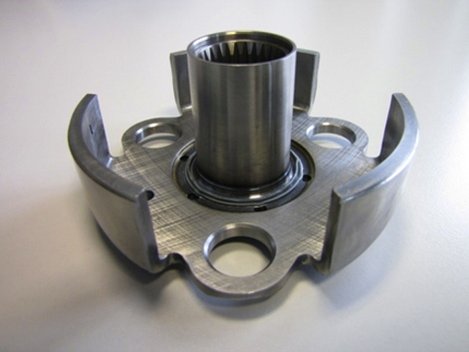Saxony-Anhalt's mechanical and plant engineers face big challenges

A sector that is focused on the future
Innovations are the key to market success. This also applies to mechanical and plant engineering, which has traditionally been the biggest single sector of industry in the Magdeburg region. Following from the reunification some 25 years ago, the sector went through a major upheaval. The region is now home to small and medium sized companies which supply to companies in a range of fields, including the automotive and wind turbine manufacturing sectors. As before, the key market for most of the companies that are active in the metals industry and which are based in Saxony-Anhalt remains Germany and the European countries. Mechanical and plant engineering continues to influence the industrial structure of the federal state. In 2014, the large companies (50 employees and more) recorded a big increase in turnover (+9.9% to 2.3 bn. Euros) and employment (+6% to 12,223). In the first half of 2015, the number of employees rose by 2.4% to 12,567.
However, 25 years after the reunification the operational capacity industrial research remains low, explains Dr. eng. Günter Ihlow, Managing Director of tti, Technology Transfer and Innovation Promotion, Magdeburg. To keep mechanical and plant engineering in Saxony-Anhalt it is therefore important for the support provided by the federal state to be continued and the research cooperation with research organisations to be expanded. In particular, this applies in terms of the challenges which companies will face due to the closer global networking (keyword industry 4.0) in the future.
In this respect, the Cluster Initiative for Specialist Machinery and Plant Engineering (SMAB) which was founded seven years ago is playing a key role. Its goal is to bring companies and research organisations that have different core competencies together in a cluster on the basis of cooperation agreements and to thereby strengthen them. According to Dr. Ihlow from Technology Transfer and Innovation Promotion GmbH, which is responsible for managing the SMAB Cluster, the individual members of the cluster will benefit from the association in a variety of different ways. Above all else, the power of innovation will be strengthened by transfers of knowledge and technology.
A good example of this is the company HB OMEGA Europe GmbH from the Sülzetal. This company, which originated from SKET Werkzeug- und Vorrichtungsbau, manufactures products that are used in the field of tool and jig construction, specialist mechanical and plant engineering, and equipment used in conveying technology. One key speciality of the company are its so-called friction welding machines, high productivity systems which enable fixed connections between different metallic material pairings at high precision.
With this know-how, the company has been increasingly successful on the world markets. The most recent example of this is the order from the Japanese company JATCO, which wants to improve its production of automatic gears.
To achieve this goal it is using a system designed by H&B OMEGA for the so-called sliding friction welding. "This is a highly promising process version of rotation friction welding, in which overlapping parts enter into an intensive cone-shaped connection," explains Managing Director Dr. Harald Schmicker. "Then there is the fact that during the friction phase, the parts centre themselves with each other." The design principle of the H&B OMEGA machines, with servo-electrical feed drive and process control enable precision frictional welding. "This means that the length tolerance of the finished parts only totals a few hundredths of a millimetre. That is a superb value for a thermal process", explains Dr. Schmicker.
The innovation became possible due to the excellent cooperation between H&B OMEGA Europe with the department of Mechanical Engineering at Magdeburg-Stendal University of Applied Sciences, the affiliated institute InKRAFT and the Otto-von-Guericke University, in addition to the company KES GmbH in the scope of the SMAB Cluster.
Following from the construction of the system in Japan, among other services, an online servicing and maintenance schedule is also planned. On this basis, with the support of the Ministry for Science and Economic Affairs, the "Platform for after-sales services 4.0 for companies in the mechanical and plant engineering sector in Saxony-Anhalt PASST 4.0" is to be developed.
Dr. Ihlow further highlights that an important requirement for maintaining the competitiveness of mechanical and plant engineers is the education, qualification and continuous further training of professional employees in a close cooperation between the companies and universities in the federal state. The Technology Transfer and Innovation Promotion Magdeburg is working together with the Chamber of Commerce to attract qualified professionals from abroad.
